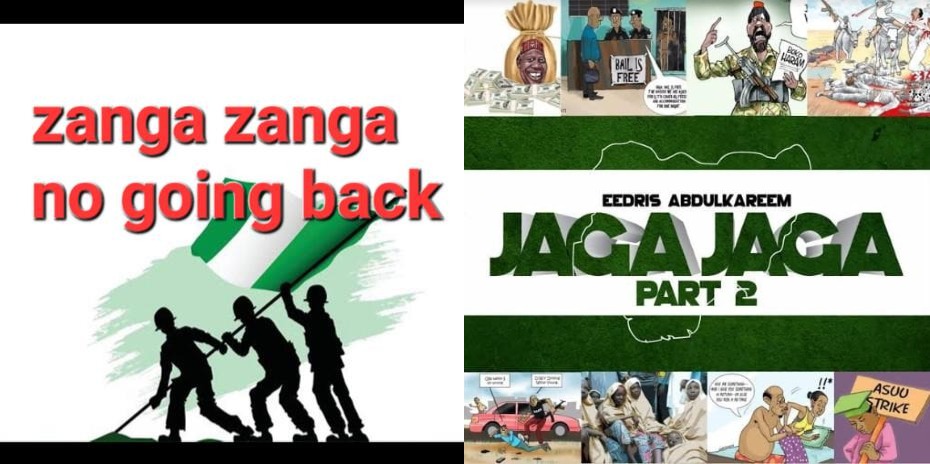OPINION
A Reflection Of ‘Zanga Zanga’ And ‘Nigeria Jagajaga’

BY ISAAC ASABOR*
Certain terms have emerged as symbols of Nigerians’ collective frustrations, aspirations, and resilience throughout their sociopolitical history. Today, as we navigate the turbulent waters of national life, two phrases stand out: “Zanga Zanga” and “Nigeria Jagajaga.” These expressions capture the prevailing sentiments of chaos, disillusionment, and the ongoing search for good governance that characterise the current era.
The colloquial expression “Zanga Zanga” is commonly used to describe protests, upheavals, and large-scale demonstrations. It represents the raw energy of the masses, particularly young people, who have taken to the streets in recent years to demand accountability, justice, and a brighter future. This phrase represents the spirit of defiance and refusal to accept the status quo, no matter how entrenched it is.
Eedris Abdulkareem, a legendary Nigerian musician, popularised the phrase “Nigeria Jagajaga” in his 2004 hit song of the same name. The phrase loosely translates to “Nigeria is in disarray” or “Nigeria is messed up,” and it resonated with many Nigerians who believed that the country’s potential was being squandered due to poor leadership, corruption, and systemic failure. Nearly two decades later, the phrase still resonates, perhaps even more profoundly, as the nation’s challenges appear to have escalated.
Nigeria’s youth, who account for a sizable proportion of the population, have become increasingly disillusioned with the country’s state. High unemployment rates, inadequate infrastructure, insecurity, and a scarcity of opportunities have fuelled a sense of hopelessness. Rather than accepting a bleak future, many young Nigerians have embraced the spirit of “Zanga Zanga” and are actively demanding change.
From the #EndSARS movement, which demanded an end to police brutality, to ongoing protests against poor governance and economic hardship, the youth have demonstrated their unwillingness to remain silent in the face of injustice. Social media has become an effective tool in their arsenal, amplifying their voices and connecting them with like-minded individuals all over the world.
The “Zanga Zanga” era is distinguished by a greater understanding of civic rights and responsibilities. It is an era in which the youth are not only challenging the old order but also attempting to redefine what it means to be Nigerian in the twenty-first century. They want transparency, accountability, and a government that actually serves the people.
Despite the vibrant activism of the youth, the phrase “Nigeria Jagajaga” serves as a stark reminder of the country’s long-standing issues. Corruption remains widespread, with those in power frequently syphoning off public funds. Insecurity has reached alarming levels, with insurgencies, banditry, and communal clashes keeping many regions in constant fear. While the economy is showing signs of growth, it has yet to provide tangible benefits to the majority of Nigerians, who are still struggling with poverty and inflation.
The crumbling infrastructure, inadequate healthcare system, and failing educational institutions all contribute to the chaos depicted in “Nigeria Jagajaga.” These issues are not new, but they have become more prominent, causing a growing sense of despair among the public.
The juxtaposition of “Zanga Zanga” and “Nigeria Jagajaga” emphasises today’s duality. On the one hand, there is deep dissatisfaction with the state of the nation; on the other, there is a steadfast determination to effect change. On the one hand, there is deep dissatisfaction with the state of the nation; on the other, there is a steadfast determination to effect change.
Meaningful change requires a concerted effort to bridge the gap between the government and the governed. Leaders must be willing to listen to the concerns of the people, particularly the youth, and take decisive action to address them. This includes enacting policies that promote economic growth, create jobs, and provide security for all Nigerians.
Furthermore, the spirit of “Zanga Zanga” must endure beyond protests. It must result in greater political participation, with more young people running for office, voting, and holding their leaders accountable. Civil society organisations and the media play an important role in holding the government accountable and advocating for people’s rights.
Without a doubt, the period of “Zanga Zanga” and “Nigeria Jagajaga” is a watershed moment in the country’s history. It is a time of great challenges, but also great opportunities. The phrases themselves serve as a call to action, encouraging all Nigerians to help rebuild the country. While the road ahead may be difficult, the people’s collective will, particularly among the youth, has the potential to pave the way for a better and more prosperous Nigeria.
-
CRIME3 years ago
PSC Dismisses DCP Abba Kyari, To Be Prosecuted Over Alleged $1.1m Fraud
-
FEATURED3 years ago
2022 Will Brighten Possibility Of Osinbajo Presidency, Says TPP
-
FEATURED2 years ago
Buhari’s Ministers, CEOs Should Be Held Accountable Along With Emefiele, Says Timi Frank
-
BUSINESS & ECONOMY2 years ago
Oyedemi Reigns As 2023’s Real Estate Humanitarian Of The Year
-
SPORTS1 year ago
BREAKING: Jürgen Klopp Quits Liverpool As Manager At End Of Season
-
SPORTS2 years ago
Could Liverpool Afford Kylian Mbappe For €200 million? Wages, Transfer Fee
-
ENTERTAINMENT2 years ago
Veteran Nigerian Musician, Basil Akalonu Dies At 72
-
FEATURED2 years ago
Tribunal Judgement: Peter Obi Warns Of Vanishing Electoral Jurisprudence, Heads To Supreme Court
-
BUSINESS & ECONOMY2 years ago
Oyedemi Bags ‘Next Bulls Award’ As BusinessDay Celebrates Top 25 CEOs/ Business Leaders
-
FEATURED3 years ago
2023 Presidency: South East PDP Aspirants Unite, Demand Party Ticket For Zone



































